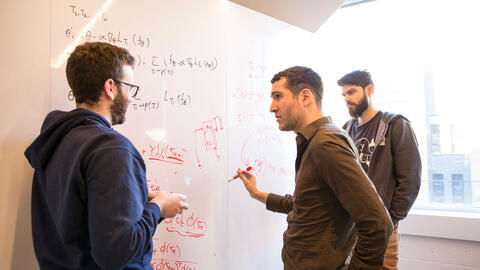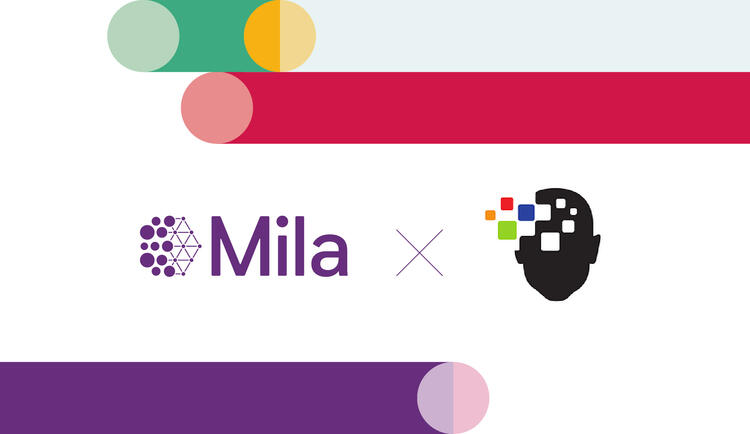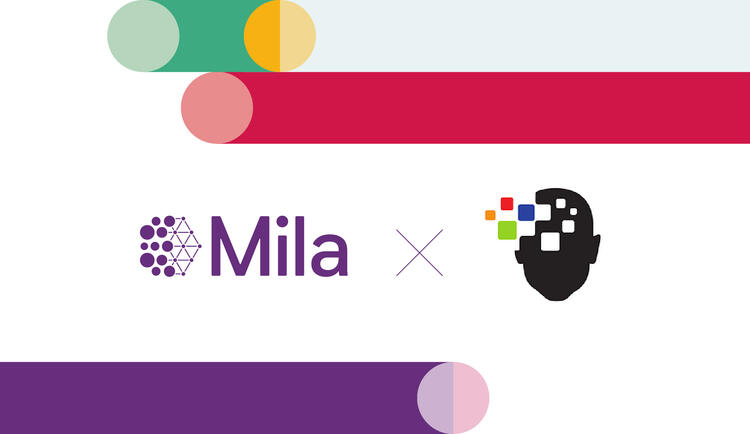
Mila News︱Ishaan Kumar
Editorial Note: This article was originally published on Medium and has been reviewed and adapted for the Mila blog with the author’s consent. The opinions conveyed in this article are entirely the authors’ and do not reflect the views of the entire Mila community.
I receive a lot of messages on LinkedIn from applicants about the professional master’s program at Mila. The majority of these curious applicants are fresh graduates who want to evaluate the pros and cons of the program. As this program is offered by Université de Montréal, a predominantly francophone institution, they also want to know how hard it is to navigate this foreign landscape. This article is an attempt to construct an FAQ page about the program in order to help new applicants make an informed decision.
Please keep in mind that I am sharing my own experience here and that yours could be quite different from mine. I will try to be as objective as possible for questions that involve my opinion, but please note that my answers are subjective and based on my own experience.
On y va?
Q. What is Mila?
A. I think it’s important to cover all the bases so as to set your expectations right and avoid future frustration.
You can think of Mila as a collaborative research group composed of researchers from Université de Montréal and McGill University, closely linked with Polytechnique Montréal and HEC Montréal. That’s it. It’s not a university. It’s not a business unit. It’s a group of people from interdisciplinary backgrounds doing collaborative research, with support from the Mila staff so that researchers work efficiently.
[Editor’s Note] Mila also establishes collaborative partnerships and contributes to projects with a range of organizations to accelerate economic and social innovation. A list of Mila industrial partners can be found here.
The Mila staff offers its students academic guidance. For information about immigration, housing and integration, please see below.
- Immigration
You can find help with everything relating to immigration through our partner universities’ international student offices. They provide information to students and help them understand the requirements each international student has to Immigration Canada. Visit the UdeM’s International Students Office (BEI) Web page for more information.
In addition, the BEI organizes a Webinar three times a week about immigration. It helps students stay informed and gives them a platform to ask specific questions about their situation.
[Editor’s Note] This FAQ page is primarily aimed at students applying to the professional master’s program. It is important to note that this program is exclusively offered at UdeM and managed by Mila. If you are an international student applying to another Mila research program, linked below are the international student offices of our partnering institutions:
McGill University: International Student Services (ISS)
Polytechnique Montréal: International Students Web page
HEC Montréal: International Students Web page
- Housing
There are a lot of Facebook groups to help incoming students find housing, and Kijiji can also serve as a good source. However, if you find an apartment using one of these sources, I would suggest that you send a message and schedule your visit in advance before signing anything, as it can be very easy to be fooled by pictures. I would advise against securing an apartment before arriving in Montreal, although I think it’s not too uncommon to do this. Below are helpful links for housing via Facebook groups.
https://www.facebook.com/groups/roommatesmontreal/
https://www.facebook.com/groups/colocationmontreal/
https://www.facebook.com/groups/335425193549035/
Once you are accepted into the program, you will have access to Mila’s Intranet where you will find this information.
- Cost of Living in Montreal
In my experience, one can live comfortably without worrying about budgeting for $1100/month. The majority of your expenses would go towards housing. If you want to reduce that cost, you can live in a colocation or student residence at UdeM. There are a lot of options if you want to reduce your food expenses too: food coops, community kitchens, aid organizations, etc. You can even sign up to be a volunteer at one of these to help the community and in return for your effort, some of these organizations will provide you with free meals.
- Integration
Mila hosts a welcome session to onboard all of its new students. In addition, you will be granted access to Mila’s intranet which has many useful resources and information. The Mila lab representatives are a resource as well. Finally, Mila offers new students the option of taking French and English classes!
Q. How is Mila involved in the professional MSc. program?
A. Mila runs the majority of the mandatory courses and optional courses. This means Mila professors manage the courses. Due to the COVID-19 pandemic, Mila has decided to move its courses to virtual platforms instead of holding them in the Mila space. Prior to COVID-19, the majority of classes were held at Mila. Class TA’s are Mila PhD students.
Mila is also kind enough to help you find an internship. It has an elaborate process that ensures that you successfully complete an internship per program requirements. This process may take time, but it works. Mila also organizes a biannual career and internship fair that is exclusive to its students and industry partners.
Q. How long is the Professional MSc program?
A. The duration of the program is three semesters with the addition of a six-month internship. In total, that comes out to be about two years, if you take some time to enjoy your summer in Montreal by taking a break, that is. I highly recommend you do this. Otherwise, if you want to make it challenging and complete it without taking a break, you can combine your last semester with your internship. I’ll explain.
Let’s say you join in Fall 2020 and proceed to complete your four mandatory courses in Fall 2020 and Winter 2021. After completing your four mandatory courses, you can start your internship in Summer 2021. Thus, you can get four months — May, June, July, August — counted towards your internship. For the remaining two months of your required six-month internship, you can work part-time during the Fall 2021 semester. In parallel, you can register for two courses and complete all the requirements by December 2021. However, you will have to register for another semester under correction status to get your internship report evaluated.
Q. At the end of the program, do we earn a Master’s in computer science or machine learning?
A. At the end of the program, it’s a Master’s in computer science (CS). I haven’t gotten my degree yet (#COVID-19) but the letter of graduation says that it’s indeed a MSc. in CS.
Q. I have done <insert a mandatory course> as part of my undergraduate program. Do I have to take it again for my Master’s?
A. No. If you can prove to the program director that the course content matches up, then you will be exempt from taking the mandatory course through Mila. However, you will have to do another course in its place. At the end of the program, you should have completed six courses in total. I was in a similar situation with an undergraduate course I had previously taken. I submitted my transcript along with the undergraduate course contents in pdf format as proofs and was subsequently exempted from needing to take it again.
Q. Is it possible to take three courses in one semester?
A. Yes, it is! Would I recommend it? No. It would be quite demanding. It’s not the difficulty, it’s the sheer amount of work that some of the courses demand. I would strongly advise against this as I think you’ll have less time to enjoy and understand the coursework. If you think you’ll have too much time to kill, you can always collaborate with one of the researchers, attend reading groups, pursue a hobby. What’s the hurry?
Q. I was admitted into the program. Now I applied for the Master’s in Computer Science at UdeM as recommended by the Mila academic team. Will I definitely get in or is it uncertain?
A. As mentioned earlier, Mila is not a university. An accepted supervision request at Mila is not a guarantee of admission to UdeM. Mila has its own criteria for selection, while the UdeM admissions committee must be sure that basic requirements in core Computer Science have been satisfied. It is certainly true that the success rate for admissions to UdeM is very high if the applicant has already been accepted by Mila, but it is not guaranteed.
Q. Can I switch from the Professional Master’s to the Research Master’s? If yes, what's the procedure?
A. Yes, it is possible to do so. The first step in this process is to find a supervisor among the Mila faculty who would be willing to take you on as a research master’s student. After this, you will need to begin the administrative process by filling out some forms. There is a deadline for this. Please reach out to student resources (TDGE) within UdeM’s Department of Computer Science and Operations Research (DIRO) to discuss the full process.
[Editor’s note] If your supervisor is not from UdeM, you will need to be enrolled in your supervisor’s affiliated university instead, meaning that you will need to start the admissions process for that university (i.e., McGill). If your co-supervisor is affiliated with UdeM, you can continue at UdeM.
In addition, note that even if it is possible in theory, switching from the professional Master's to the research Master's program is very rare in practice. The main way to enter the research Master's program is to apply through the Mila supervisor-matching process (open from Oct. 15th to Dec. 15th every year for supervision the following Fall semester) or through the corresponding affiliated University's (e.g. McGill) admission process.
Q. Is it possible to take all the courses for the Professional MSc. in Machine Learning in English?
A. Yes, it is possible to take all your courses in English. UdeM has a policy where you can request all evaluations (exams, assignments, etc.) in either language (EN/FR). This is true for all graduate-level courses. The language of instruction depends on the instructor. It is somewhat guaranteed that the mandatory courses mentioned on the program’s informational Web page would be in English. This is not true for additional courses that the department might instruct you to register for.
Q. Is it possible for a non-francophone student to find an internship in Montreal?
A. Yes! A lot of anglophone Prof. MSc. students do their internship in Montreal. Although you will encounter French in your workplace, I saw it as the perfect opportunity to improve my French and learn a little bit about the culture. As with most things in life, your experience will be a function of your own perspective. Most of the ML research and programming is done in English anyway, so even if you don’t know French, you will get by just fine.
Q. Can we also look for internships outside of the ones offered by Mila’s partners?
A. Yes, you can intern at a company that’s not a Mila partner. However, you will need to get your project approved by Mila.
Q. Can you take classes offered at other universities that might not be affiliated with Mila?
A. Yes! However, this is not specific to Mila. Students enrolled in a Quebec university can enroll for courses in other Quebec universities under a program called BCI. For example, to complete your two open electives, you can utilize this option to enroll in courses offered by McGill, Concordia, Polytechnique, etc.
Q. What are the funding opportunities available to Professional MSc. students at UdeM and Mila?
A. International students have to pay an “international student” fee in Quebec. However, international students may benefit from a scholarship that waives these fees. You don't have to apply for it, it will be evaluated by UdeM for all international students at the time of the application. For more information please consult the UdeM Web page here - admission (in En, Fr, Pt and Es) - and here - Bureau du registraire (in Fr).
Keep in mind that the internship as part of the program requirements is a paid internship that will compensate you well enough to cover at least half of your program fees.
For most companies offering internships through the program, half of the amount the student receives as an intern will come from the Mitacs Accelerate Program funds. That means that you must apply for it before starting your internship. Mila provides all assistance for the Mitacs application and organizes a Mitacs information session prior to the Mila Job Fair. More information can be obtained from Gabrielle Gingras, Mila’s Mitacs and internships specialist.
Visit Mila’s Professional Master’s Program Web Page for more information about the program, or DIRO’s procedural Web page. Information about all Mila programs can be found on here.
The recruitment period for all Mila programs runs from October 15 to December 15, 2020.




